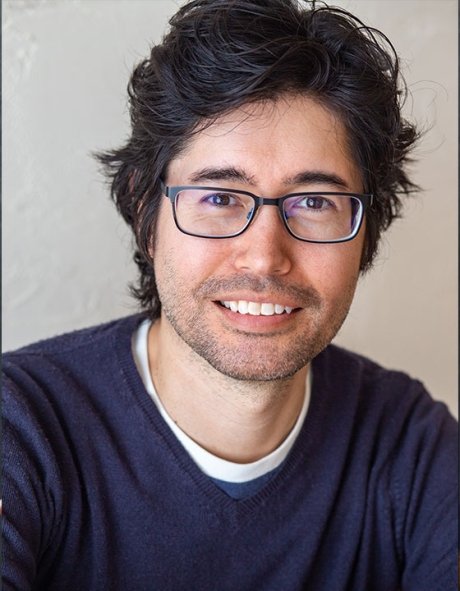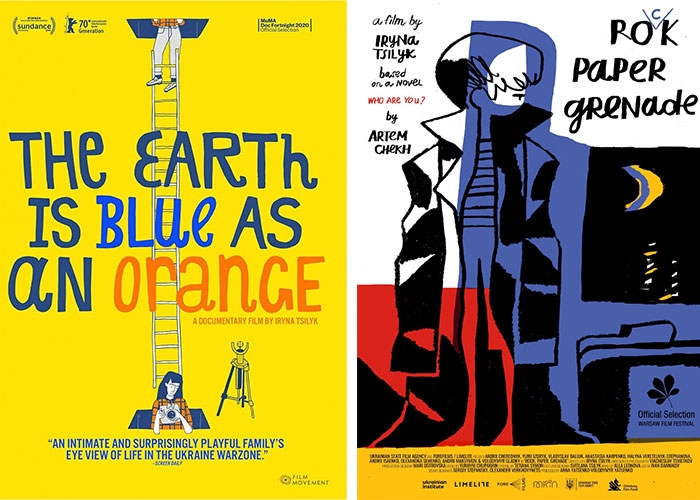Prof. Vince Bohlinger Awarded Mary Tucker Thorp College Professorship
- News & Events
- News
- Prof. Vince Bohlinger Awarded Mary Tucker Thorp College Professorship

Bohlinger will present Thorp lecture on Ukrainian film on Wednesday, March 20, at 4 p.m. in Alger 110.
RIC Professor and Director of Film Studies Vince Bohlinger has been awarded the 2023-2024 Mary Tucker Thorp College Professorship. On Wednesday, March 20, at 4 p.m. in Alger 110, he will present the Thorp lecture, titled “My Adventures with Ukrainian Cinema.” In his lecture, Bohlinger will offer an overview of his research on Soviet and Post-Soviet film and chart his growing interest in contemporary Ukrainian cinema. This lecture is open to the public.
For more than 15 years, Bohlinger’s principal area of research has been Soviet and Post-Soviet film, yet for the past several years – in both his teaching and scholarship – he has turned his attention to the cinematic output of Ukrainian filmmakers, an interest that grew after Russia’s full-scale attack on Ukraine in 2022. This invasion became the largest attack on a European country since World War II.
In his lecture, Bohlinger will offer an overview of his research on Soviet and Post-Soviet film and chart his growing interest in contemporary Ukrainian cinema.
In the July 2022 issue of “KinoKultura,” an online journal on the cinema of the Post-Soviet sphere, Bohlinger co-edited a special section titled “Focus on Ukraine,” which consisted of nearly 40 reviews of films and five interviews with filmmakers.
The following year, he co-edited another section in “KinoKultura” on “Contemporary Ukrainian Documentary,” which consisted of four filmmaker interviews and over 30 essays.
In 2023 he taught a RIC course on Ukrainian cinema and organized a Ukrainian Film Series at the college that included live Zoom discussions with the filmmakers.

On Friday, March 22, Bohlinger will host internationally acclaimed author and Sundance-winning filmmaker Iryna Tsilyk from Ukraine and screen her film “The Earth is Blue as an Orange” (2020), along with excerpts from her film “Invisible Battalion” (2017). The screenings will take place at 7 p.m. in Gaige 100, followed by a discussion with the filmmaker.
On Saturday, March 23, a screening of Tsilyk’s newest film “Rock. Paper. Grenade” (2022) will be held at 4:30 p.m., location TBA.
Both events are free and open to the public.
In a 2023 Q&A with RIC news, Bohlinger discussed some of the Ukrainian films that have emerged since the start of the Russo-Ukrainian War in 2014. The following is a reprint of that interview:
Professor Bohlinger, how are Ukrainian films reflecting on the war?
Some films directly document the crimes being committed by Russia. For instance, “Intercepted,” a documentary, consists of secretly intercepted phone calls of Russian soldiers to their families back home. You hear a soldier telling his wife that he has stolen makeup for her along with size 38 New Balance sneakers from the home he just looted. “Grab whatever you can,” she says. “We always need t-shirts.”
In another phone call a serviceman describes fellow soldiers shooting an unarmed woman dead in front of two children. “Why not?” his wife responds. “She’s considered an enemy, too.”
Other Ukrainian films are examining what it’s like to live under siege. “The Earth is Blue as an Orange” is a documentary that won the Directing Award at the 2020 Sundance Film Festival. It’s about a single mother and her children who make a film about living life in a war zone. There’s a kind of absurdism and sweetness to this film. It’s about the magic of moviemaking.
You said one of the ambitions you had for your course on Ukrainian cinema was to showcase a Ukrainian cultural identity that is distinct from Russia. How are filmmakers defining a separate Ukrainian identity?
Though the boundaries between Russia and Ukraine are clear, the boundaries of culture are not. In some films there’s a kind of nostalgia toward the old Soviet heritage that both Russia and Ukraine share. For instance, in the documentary “Heat Singers,” the workers at a heating plant, who provide heat to all the homes in the town, form a choir. Every day, the townspeople are on the phone yelling at the workers and accusing them of not doing their jobs because they have no heat. But once a week, the workers stop everything to rehearse old songs, even dressing in traditional clothing. It’s a very Soviet mentality. They’re still reenacting some bygone day, even when facing all the difficulties inherited from those bygone days.
As far as the Ukrainian cultural identity, I think it’s still being figured out. I think Ukrainian cultural identity is more about mindset. Ukrainians are consciously moving toward a European and Western mindset around democracy, freedom, the right to self-governance and self-determination. I think we’re watching cultural formation happen in real time.
The Thorp award is given each academic year to a full professor with at least six years of service at Rhode Island College who has demonstrated excellence in teaching and scholarship and/or excellence in professional and collegial service.
Committed to international education, Bohlinger is currently RIC’s Fulbright program advisor. Due to his mentorship of student applicants, RIC has had a Fulbright winner for three years in a row. Bohlinger is also co-advisor for the Asian Student Association.
Currently, he is working on a book titled “Toward a Second Utopia: Soviet Film Style between Montage and Socialist Realism, 1928-1936.” This project examines changes in the content, look and sound of Soviet films during the early years of Stalin.
